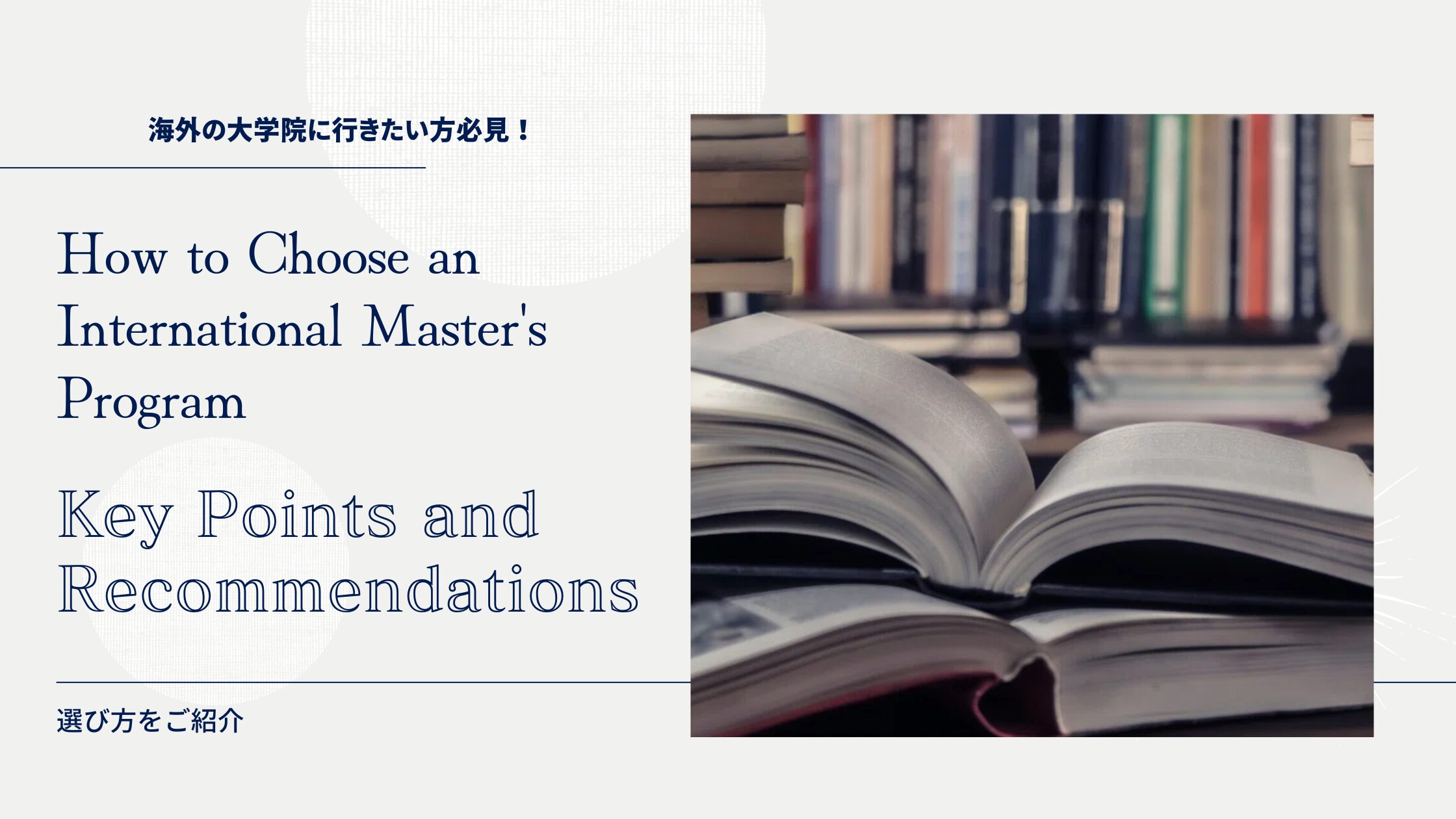Have you ever considered pursuing research at an international graduate school after earning your bachelor’s degree? Whether you go straight after graduation or decide to return to academia after gaining work experience, there are many reasons to study abroad. In this guide, we introduce key points to consider when choosing an international graduate program.
- How to Choose an International Master’s Program: Key Points and Recommendations
- Check Your Desired Field of Study and Curriculum
- Consider Which Country You Want to Study In
- Look Beyond Rankings and Research Reputation
- Verify the Mode of Instruction (Online, In-Person, or Hybrid)
- Check Whether the University Welcomes a Diverse Student Body
- Research Tuition Fees and Scholarships
- Understand Admission Requirements and Necessary Exams
- Review Visa and Living Support Options
- Conclusion
How to Choose an International Master’s Program: Key Points and Recommendations
Check Your Desired Field of Study and Curriculum
One of the most crucial factors in selecting an international graduate school is ensuring that the program’s curriculum aligns with your academic and research interests. Check the following points:
- Review the course content and syllabus on the official website
- Investigate the research topics of the faculty members
- Ensure the availability of research facilities and resources
Consider Which Country You Want to Study In
The education system, tuition fees, culture, and job opportunities vary significantly by country. To select the most suitable country for your goals, consider the following:
- Quality of education and research environment (e.g., the U.S., U.K., Canada, and Australia have well-established research institutions)
- Tuition fees and scholarship options (some European countries offer relatively low tuition fees)
- Post-graduation career prospects (ease of obtaining a work visa and employment opportunities in the host country)
- Cost of living and safety (varies greatly between urban and rural areas)
- Language environment (non-English-speaking countries may require proficiency in the local language)
Look Beyond Rankings and Research Reputation
University rankings can be a useful reference, but actual reputation and alumni career success are also critical factors.
- Refer to QS World University Rankings and THE (Times Higher Education) Rankings
- Check LinkedIn and university websites for alumni career paths
- Browse forums and social media for reviews from past international students
Verify the Mode of Instruction (Online, In-Person, or Hybrid)
Graduate programs now offer various learning formats, including online, in-person, and hybrid (a combination of both).
- Fully online: No need to travel; study from anywhere in the world
- In-person: Opportunities for networking and access to on-campus research facilities
- Hybrid: Combines the advantages of both online and in-person learning
Choosing the right mode of instruction that fits your lifestyle and learning preferences is essential.
Check Whether the University Welcomes a Diverse Student Body
Studying in an international environment broadens perspectives and enhances learning experiences. Consider the following:
- The diversity of the student body (percentage of international students and nationality mix)
- University policies that promote inclusion and diversity
- Support systems for international students (language assistance, cultural adaptation programs, etc.)
Research Tuition Fees and Scholarships
Pursuing a master’s degree abroad can be expensive, so it’s crucial to explore scholarships and financial aid options.
- University-specific scholarship programs
- Government and foundation scholarships (e.g., Fulbright, DAAD, MEXT)
- Grants and student loan options
Understand Admission Requirements and Necessary Exams
Most international graduate schools require applicants to meet specific admission criteria and standardized test scores (TOEFL, IELTS, etc.).
- Ensure your GPA meets the minimum requirements
- Check if GRE or GMAT scores are necessary
- Prepare high-quality recommendation letters and personal statements
Review Visa and Living Support Options
To ensure a smooth transition to studying abroad, research visa requirements and available student support services in advance.
- Student visa application procedures
- Housing options (dormitories, apartments, etc.)
- Availability of part-time jobs and internships
Conclusion
When choosing an international graduate school, it’s important to look beyond just rankings and name recognition. Selecting a program that aligns with your academic and career goals is key. Conduct thorough research and make an informed decision.
By following these steps, you can successfully plan your study abroad experience and find the best international graduate program for you!

Let’s start researching right meow!
![]()



